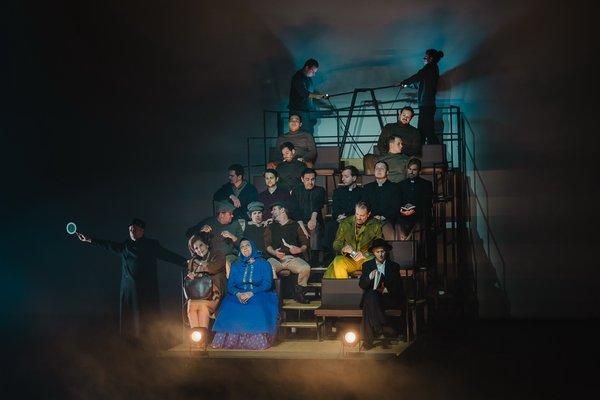

VALUSKA
8 December 2023, 8 p.m.
In Brief
Commedia tragica in twelve tableaux, one act, in Hungarian, with Hungarian and English surtitles
There is about to be a major moment in Hungarian music history: in the new season, the OPERA will present the first opera written in Hungarian by Péter Eötvös, celebrating the 80th birthday of the internationally renowned composer in January 2024. The work is a musical theatre adaptation of László Krasznahorkai's novel The Melancholy of Resistance. The story may already be familiar from the film Werckmeister Harmonies, but, of course, the composer approaches the topic from a different angle compared to the director of the film, Béla Tarr. “Valuska, a young man with a pure heart, becomes a victim of a manipulative society in the shadow of a stuffed whale”, says Péter Eötvös about his thirteenth opera, which was commissioned by the OPERA and whose predecessors have been performed all over the world. Many of them have already been seen by Hungarian audiences. His works Three Sisters and Love and Other Demons have previously been staged at the Opera House. Valuska is directed by Bence Varga.
Commissioned by the Hungarian State Opera
Details
- Location
- Eiffel Art Studios – Miklós Bánffy Stage
- Date
- Dec. 8, 2023
- Start time
- 8 p.m.
- End time
- 10 p.m.
Synopsis
Péter Eötvös's opera takes us to a bare, grey world, an unknown yet familiar small town, and conjures up a real tragicomedy on the opera stage.
The title character János Valuska is, as it were, the noble fool of the village, a newspaper delivery man at the post office. He is different from the townspeople: he is not motivated by the desire for power, he is pure and innocent, unlike his mother, Mrs Pflaum, who is constantly at odds with her son. He is fascinated by the world and marvels at the beauty of the universe and the planets with an almost childlike naivety, he even tries to explain it to the local pub crawlers. Yet everyone remains impassive about these beauties, especially Tünde, the mayoress, who invites a travelling circus to the town with fatal consequences: in order to build something new, she must destroy the existing system, and the mob excited by the circus proves to be an excellent means to this end.
The main attraction of the circus is the world's largest taxidermied whale, and the other one is rumoured to be a mysterious, perhaps non-existent, three-eyed, chirping Prince. An ideology anyone can embrace, anyone can cling to. After a terrible act of looting and arson, a new – military – order is established in the town, and Valuska is only saved by being locked up as a lunatic. Just as he used to visit Tünde’s husband, the retired, disillusioned, and embittered intellectual Professor, now it falls to the old teacher to visit Valuska in the asylum.
It is a bare, grey world, but with a lot of humour, burlesque, and grotesque – seemingly unbelievable, making it painfully believable.
Gallery
Reviews
"Director Bence Varga brings to life this dystopian town, which could reflect any town, any society in any country, with chilling insight and detail. (...) Eötvös is renowned for his innovative and eclectic musical style. In Valuska, his first opera written in his native Hungarian, he blurs the boundaries between traditional and avant-garde music, creating a unique soundscape with complex rhythms, vivid textures and a keen sense of drama, which reflects his deep understanding of the theatricality of music."
Zenaida des Aubris, Bachtrack